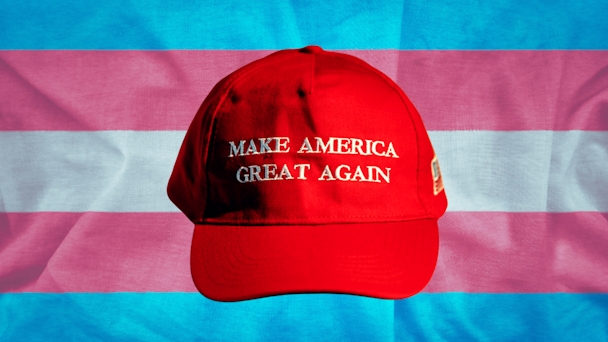What Trump’s win – and $215m worth of anti-trans ads – mean for the future of campaigning
Trump’s re-election, fueled in part by divisive campaigns, has raised ethical concerns among marketers, who now see an urgent need for brands to help counter these narratives.

The Trump campaign invested $215m in anti-trans ads / Credit: Audrey Kemp
In a stunning turn of events, Donald Trump won his second term as President of the United States last night, defeating Democratic candidate Kamala Harris.
Much of Trump’s 2024 campaign has been rooted in divisive rhetoric and fear-based tactics. According to recent data from AdImpact, Republicans spent nearly $215m alone on network TV ads that vilified transgender people.
“Attacking our community was without a doubt their #1 ad priority,” Montana state Representative Zooey Zephyr (D) wrote on X. Harvard Law Cyberlaw Clinic’s Alejandra Caraballo added, “That’s $134 per trans person in anti-trans ad spending. To say that this assault on our community has been disproportionate is an understatement.”
For many in the marketing industry, the scale and nature of Trump’s ad strategy raise urgent questions about the ethical responsibilities of advertising at large, particularly when campaigns target marginalized groups. As the country prepares for a second Trump term, marketers are now considering how the industry can leverage its influence to help heal deepening divides.
Facing fear-based advertising
While much of Trump’s campaign centers on fear-based messaging, industry experts argue that his approach is far from new. “Advertisers have long been in the business of manufacturing monsters that don’t really exist, amplifying the stakes, and selling their product as the antidote,” says Rachael Kay-Albers, founder and creative director of brand studio RKA Ink. “Fear appeal ads are so popular, both commercially and politically, because fear moves people to take urgent action.”
Kay-Albers points out that when fear-based advertising targets marginalized groups, its effects extend beyond the voting booth. She references the infamous 1988 Willie Horton ad produced to support George HW Bush’s campaign. While the ad didn’t explicitly mention race, it used Horton’s image to reinforce harmful stereotypes of Black men as violent criminals, stoking racial tensions alongside political aims.
“Knowing this, marketers must ask ourselves: can fear appeals and purpose-driven messaging coexist?” she says. “How can we use our position as creative advocates to shape political messages where we all win, not just our candidate?”
Want to go deeper? Ask The Drum
Others in the industry echo these concerns, emphasizing the lasting impact of fear-based campaigns on vulnerable communities.
“Fear-based campaigns have measurable, often harmful effects on targeted communities,” says Jimmy Philémond-Montout, Canadian DEI expert and general manager of Diversité Artistique Montréal, an organization dedicated to promoting diversity in Montreal’s arts and culture sector.
Philémond-Montout cites research from GLAAD and the Anti-Defamation League (ADL), which identified over 350 incidents of harassment, vandalism and assault against LGBTQ+ individuals from June 2022 to April 2023 – a period marked by rising anti-LGBTQ+ rhetoric and legislation. “The frequency of anti-trans narratives correlates with increased reports of violence against trans individuals, creating an environment where marginalized people feel unwelcome or unsafe,” he explains.
For some, these divisive aspects of Trump’s campaign highlight the crucial responsibility marketers have to counter harmful narratives.
“Trump’s poisonous campaign rhetoric, from fear-mongering about Haitian immigrants to disparaging Puerto Rico, has long fueled baseless narratives that pit groups against one another,” explains Lauren Kay-Lambert, co-managing director of Shape History, a social impact communications agency. “Marketers bear a crucial responsibility to ensure that advertising is truthful, ethical and avoids harmful stereotypes. Misleading messaging risks not only misinforming the public but igniting real-world anger and violence.”
A choice between division & inclusivity
Trump’s re-election may further influence existent political polarization; the American Psychological Association (APA) recently reported that nearly two-thirds of adults (64%) feel that their rights are under attack, and about 41% have considered moving to another country due to the state of the nation. In this climate, purpose-driven campaigns rooted in empathy may offer a path to healing.
“Advertisers hold a significant responsibility to consider the real-world impact of their messages, especially when it comes to marginalized groups or sensitive social issues,” says Mahak Agrawal,urban planner, climate scientist and sustainability expert, founder of All Bits Count. While purpose-driven messaging can be impactful, Agrawal warns that “it requires authenticity and care in execution. Brands must avoid using purpose as a trendy marketing tactic, as it can quickly backfire.”
She points to campaigns such as Levi’s ‘Buy Better, Wear Longer’ and Airbnb’s ‘We Accept,’ which resonated with audiences by focusing on shared values and empathy. “To minimize harm, brands should work with advocacy groups and maintain ongoing dialogues with affected communities,” she adds.
Philémond-Montout identifies more companies that have thoughtfully engaged with social issues and inspire connection: “For brands, Trump’s campaign strategy is a stark reminder of how advertising can foster division under the guise of a ‘strong’ message. Effective messaging should inspire, not incite. Brands such as Patagonia and Ben & Jerry’s have shown it’s possible to address social issues with integrity, avoiding polarization by presenting an inclusive vision.”
Advertisement
As the nation faces another four years under a Trump administration, the path forward remains uncertain – particularly for marginalized communities targeted by the campaign. For many, this underscores an urgent call for brands to step in with empathy-driven messages that can counter divisive rhetoric.
“Ethical advertising has the power to shape perceptions and inspire positive change,” says Kay-Lambert of Shape History. “It’s time to reject manipulative identity politics in an attempt to win votes and embrace a more responsible, respectful approach that serves the public good.”
